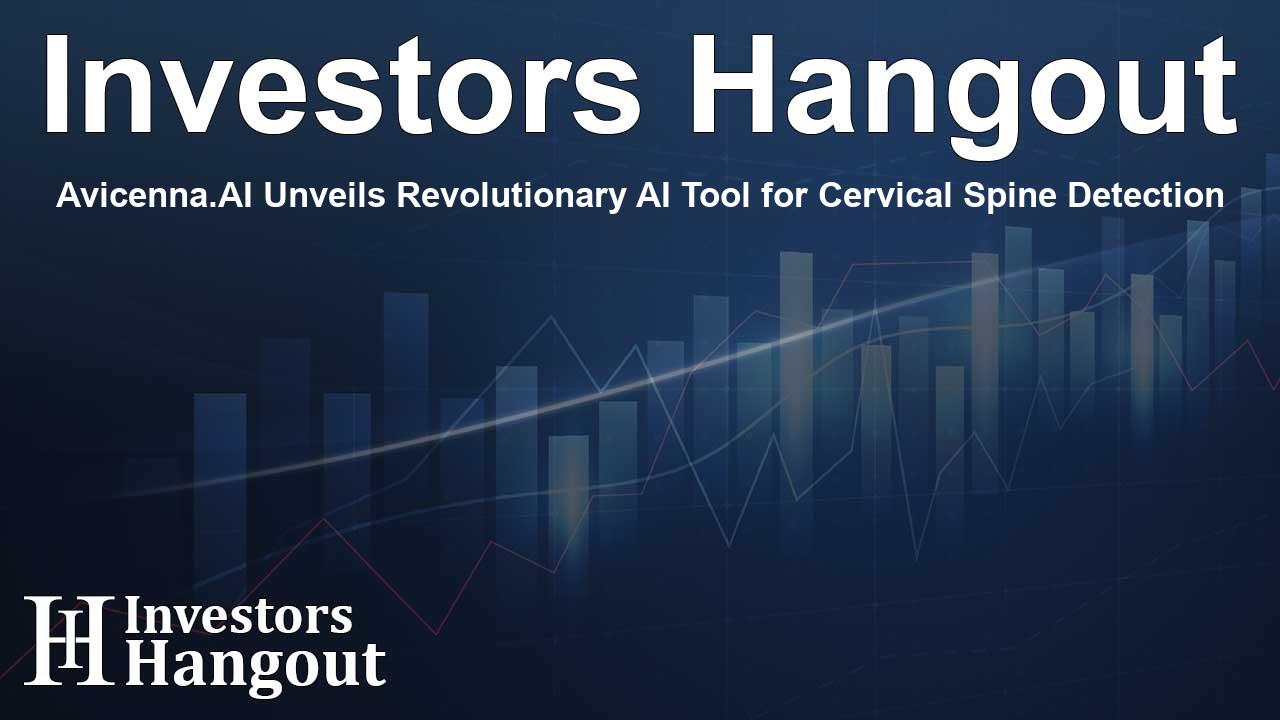Avicenna.AI Unveils Revolutionary AI Tool for Cervical Spine Detection

Avicenna.AI Achieves FDA Clearance for a Groundbreaking AI Tool
Medical imaging has taken a significant leap forward with Avicenna.AI's recent FDA clearance for its CINA-CSpine algorithm. This innovative tool is specifically designed to detect and triage cervical spine fractures from CT images, a crucial advancement in emergency medical care.
Understanding Cervical Spine Fractures
The cervical spine comprises seven vertebrae in the neck, and fractures in this area can pose myriad medical challenges. Typically caused by trauma, these fractures are serious and can lead to severe outcomes such as spinal cord injuries, which may result in lasting neurological damage or paralysis.
The Importance of Timely Detection
Timely treatment is essential for patients with cervical spine injuries. The sooner these fractures are diagnosed and treated, the better the chances are for optimal recovery. Using the CINA-CSpine tool, radiologists can quickly identify potential threats in CT scans, expediting the process of care for affected patients.
Quote from Leadership
Cyril Di Grandi, co-founder and CEO of Avicenna.AI, emphasizes the importance of accurate diagnosis: "Cervical spine fractures are serious injuries that require prompt and appropriate medical attention, especially if the spinal cord is involved, so accurate diagnosis is essential. With CINA-CSpine, we aim to help reduce the delay between scan and interpretation, which is critical in the treatment of this condition."
Enhancing Clinical Workflow Efficiency
In addition to its rapid detection capabilities, CINA-CSpine functions seamlessly within existing clinical workflows. This integration ensures quick alerts for radiologists, allowing them to leverage their current systems when assessing patient scans. Such advancements in AI technology are changing the landscape of medical imaging, ensuring that clinicians are better equipped to respond to emergencies effectively.
Validation and Performance Metrics
The CINA-CSpine tool was validated using a set of over 300 CT scans obtained from various sources in the medical community. The results showed commendable overall sensitivity of 90.3% and a specificity of 91.9%. These metrics were derived from consensus evaluations performed by three board-certified senior radiologists, showcasing the algorithm's reliability in real-world situations.
Stakeholder Insights
Di Grandi further comments on the significance of these results: "These results demonstrate that our CINA-CSpine algorithm is capable of providing prompt and accurate findings that could positively guide physicians towards better assessments and improved patient outcomes."
A Growing Portfolio of AI Solutions
This new tool marks just the latest addition to Avicenna.AI's expanding portfolio, which includes several other AI tools that support the detection of a range of conditions. Each tool, including CINA-ICH for intracranial hemorrhage and CINA-AD for aortic dissection, embodies the company's commitment to improving patient care through innovative technology.
About Avicenna.AI
Founded in 2018, Avicenna.AI is a pioneering company in the field of healthcare AI solutions. With an emphasis on harnessing deep learning techniques, the organization strives to identify and address severe medical conditions through advanced imaging technologies. Co-founded by accomplished entrepreneurs and experts in the field, Avicenna.AI aims to enhance clinical outcomes and aid healthcare professionals in their decision-making processes.
Contact Information
For further inquiries, please contact Stéphanie Bellavia, Marketing Manager at Avicenna.AI.
Frequently Asked Questions
What is the CINA-CSpine tool?
The CINA-CSpine tool is an AI algorithm designed to detect and prioritize cervical spine fractures from CT images, improving diagnostic efficiency.
Why is timely detection of cervical spine fractures important?
Timely detection is critical to avoid serious complications such as paralysis, as prompt medical attention can significantly enhance patient outcomes.
How accurate is the CINA-CSpine tool?
The CINA-CSpine tool demonstrated an overall sensitivity of 90.3% and specificity of 91.9% during its validation process against expert radiologists' assessments.
Who leads Avicenna.AI?
Avicenna.AI is co-founded by Cyril Di Grandi, a successful entrepreneur, and Dr. Peter Chang, a noted radiologist and expert in AI and deep learning.
What other AI tools does Avicenna.AI offer?
Avicenna.AI's product portfolio includes various AI solutions for conditions like intracranial hemorrhage, large vessel occlusion, and pulmonary embolism, among others.
About Investors Hangout
Investors Hangout is a leading online stock forum for financial discussion and learning, offering a wide range of free tools and resources. It draws in traders of all levels, who exchange market knowledge, investigate trading tactics, and keep an eye on industry developments in real time. Featuring financial articles, stock message boards, quotes, charts, company profiles, and live news updates. Through cooperative learning and a wealth of informational resources, it helps users from novices creating their first portfolios to experts honing their techniques. Join Investors Hangout today: https://investorshangout.com/
Disclaimer: The content of this article is solely for general informational purposes only; it does not represent legal, financial, or investment advice. Investors Hangout does not offer financial advice; the author is not a licensed financial advisor. Consult a qualified advisor before making any financial or investment decisions based on this article. The author's interpretation of publicly available data shapes the opinions presented here; as a result, they should not be taken as advice to purchase, sell, or hold any securities mentioned or any other investments. The author does not guarantee the accuracy, completeness, or timeliness of any material, providing it "as is." Information and market conditions may change; past performance is not indicative of future outcomes. If any of the material offered here is inaccurate, please contact us for corrections.